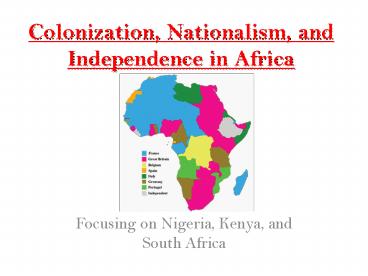Colonization, Nationalism, and Independence in Africa - PowerPoint PPT Presentation
1 / 16
Title:
Colonization, Nationalism, and Independence in Africa
Description:
African colonies remained under European control until the 1950s, following the end of WWII. ... The Boers, the original white Dutch colonists, lived in SA at ... – PowerPoint PPT presentation
Number of Views:132
Avg rating:3.0/5.0
Title: Colonization, Nationalism, and Independence in Africa
1
Colonization, Nationalism, and Independence in
Africa
- Focusing on Nigeria, Kenya, and South Africa
2
Colonization
- Europeans ran to Africa and took all of the land
that they wanted. - African colonies remained under European control
until the 1950s, following the end of WWII.
3
Nationalism
- Prior to, during, and after WWII, many African
colonies began to experience a growth in
Nationalism. - Nationalism Pride in ones country (In Africa
this was more like pride in ones tribe). - Pan-Africanism and Pan-Arabism were two
nationalistic movements that were not successful. - There were many movements, however, that were
successful!
4
Independence
5
Nigerian Nationalist Movement
- Nigeria was colonized by Britain in the early
1900s. - Great Britain used indirect rule to control
Nigeria. They gave power to a few local leaders
and enforced their rules through those leaders. - Great Britain had little involvement in Nigerias
affairs, leading many to dislike them.
6
Nigerian Nationalist Movement.
- A group of nationalists rose up during the
1920s, opposing certain taxes and asking for
changes in the leadership of the country. Little
change was made. - Another group of nationalists rose up after WWII
after they had fought for Britain and heard of
other British colonies gaining freedom (such as
India).
7
Nigerian Nationalist Movement
- Nigerian Nationalists pushed for changes, gaining
independence in 1960. - From 1960 until today, Nigeria has seen constant
war over leadership within the country. - The country is currently at peace.
8
Kenyan Nationalist Movement
- The colony of Kenya was established by Great
Britain in the early 1900s. - Kenyan people sought independence after WWII,
like other African Nations. - The Kenya African Union, a group of people who
wanted to freedom, gained power after seeing
other British nations become independent. Jomo
Kenyatta became its president in 1947.
9
Kenyan Nationalist Movement
- The Mau Mau, a militant (more violent)
nationalist group rose up in 1952. They sought
independence through violent acts. It was
believed that Jomo Kenyatta was a leader of this
group, and he was imprisoned in 1953. - By 1957, Great Britain was more willing to give
the African Kenyans the majority of the power in
the country. - In 1961, elections were held.
- Kenyatta was freed in 1961 and many nationalists
viewed him as their leader.
10
Kenyan Nationalist Movement
- Kenya became independent in 1963, and Kenyatta
was their leader. - Kenya experienced some political unrest between
different groups, but is peaceful today.
11
South African Nationalist Movement
- South Africa was a colony that was founded by the
Dutch, but owned primarily by Great Britain. - Slavery was rampant in South Africa until the
1820s when Slavery became less acceptable in
Britain. Coloured people were still treated
very poorly. - The Boers, the original white Dutch colonists,
lived in SA at this time and had little power.
12
South African Nationalist Movement
- Indians also lived here and were treated poorly
(Britain owned India at this time and used many
Indians as servants). - Whites ruled over South Africa, which was very
segregated (called Apartheid, it was separated
into whites, Asians, coloureds, and blacks). - The African National Congress, a black
organization in South Africa, was established in
1912 and began to fight for rights.
13
South African Nationalist Movement
- Whites in SA gained more power in the early
1900s. - People of color (blacks, coloureds, and Asians)
began fighting for the end of segregation after
WWII (1948). - In 1961, the Republic of South Africa was formed
by the whites living there (main control was held
by whites of British descent). - Apartheid was still in full effect.
- Several nationalist groups rose up to fight
Apartheid, including the white Afrikaners
(ancestors of Dutch, French, and German
settlers), who were treated poorly by the British
descendants as well.
14
South African Nationalist Movement
- Nationalists struggled for years for rights,
many, such as Nelson Mandela, landing in jail. - Apartheid ended in 1994. Nelson Mandela, the
freedom fighter who had been thrown in jail, and
F.W. de Klerk, the white president of SA at the
time, were credited with ending apartheid. - Nelson Mandela was elected to be the first black
president of South Africa. - South Africa is at peace today.
15
South African Nationalist Movement
- Nelson Mandela
- F.W. de Klerk
16
4-3-2-1
- In complete sentences on a separate sheet of
paper, write the following - 4 ways in which European colonization changed the
face of Africa. - 3 reasons why European borders caused problems in
Africa. - 2 people who were important in independence
movements in Africa. - 1 problem that still occurs in Africa due to
colonization.































